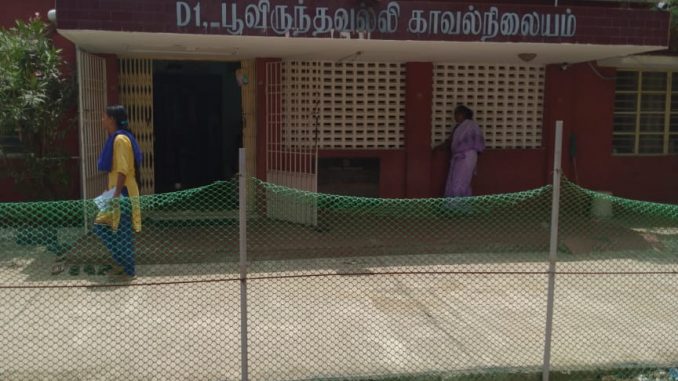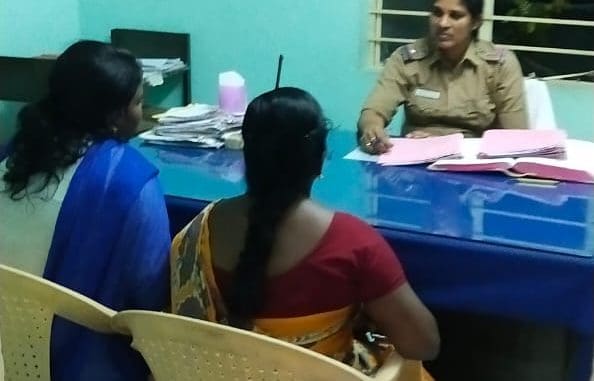With a stern gait and watchful eyes, Franvin Dani enters the D1 All Women Police Station at Poonamallee**. The station, which is just a few yards from the busy Poonamallee junction at Karayanchavadi, is a maroon and cream coloured building, just like most of the police stations in Chennai. It is a house that has been converted into a make-shift police station with a criminal cell, a room for the inspector, a typist’s room and a waiting hall for the complainants.
A posse of women constables rise up to wish their inspector and give her an update on the crucial cases: the conflict between a wife and her alcoholic husband, a theft and a case of child abuse. It is a Sunday morning and while the city is apparently less chaotic and more peaceful, with less traffic and activity, the police station has already recorded seven cases. Files of FIR and complaint copies lie on the desks at the station.
“This is just a small number. We usually get three times more cases on a daily basis,” said Latha, head constable.
A long day ahead
Every day gives brings its share of challenges for these women. They witness and feel the deepest emotions: anger, hatred, love and kindness. From counselling victims to filing strong cases against perpetrators and providing protection to the needy, they have to play a variety of roles depending on the case in hand.
The pattern of cases registered in the station are mostly predictable, though. Like all women stations, D1 station gets complaints involving family disputes, cases related to illicit relationships, harassment of women and offences under Protection of Children from Sexual Offenses Act (POCSO).
On this occasion, Dani is visibly disturbed about the child abuse case that had just been registered at the station. “At least two cases of child abuse gets registered at the station every month. This fact disturbs me,” she says. Understanding and compassionate, Dani assures the girl, who was molested by her uncle, that she will get justice. “I understand how you feel right now. But be brave and face this situation. You will overcome,” she says, patting her back and putting an arm around her.
The next minute, she enters the criminal cell and grills the alleged perpetrator to get more information out of him. But in vain. She leaves the room, promising to come back.
Not all cases, however, get registered at the women police stations. In most cases, women complainants want the police to ‘counsel’ their abusive husbands or settle domestic issues amicably. A woman who owns a roadside stall wanted to snap out of her abusive marriage without going to the court.
“Please ask him not to visit me, Madam. I am done living with him,” cries the woman. The alcoholic husband had beaten the woman and her mother black and blue.
Women police officers try to mediate in such issues rationally. In this case, the husband was asked to take treatment at a rehabilitation centre. “Only if you quit the habit will you get to live with your wife,” a constable tells him.
The human face
A lot of citizens see police officers as obnoxious people, who cannot be trusted. The stigma is so deep-rooted that many citizens feel uncomfortable to even step inside police stations. “It is true that there have been many instances of police officers being rude to people, but stereotyping the profession is unfair. There are righteous and kind officers everywhere,” says Dani.
A few minutes later, during lunchtime, a trader with bundles of dress material visits the station. The lady officers gulp down their lunch as early as they can, to use the few remaining minutes of their break to shop. A senior constable chooses a yellow material for herself, but her colleague objects: “You have hundreds of dresses of that colour. Pick something else.” The senior constable is visibly confused and undecided, till her colleague finalises a red kurthi for her.
In spite of the odds
Lunch over, they get back to work in no time. Despite rigorous schedules that sometimes last 14 hours at a stretch, women officials manage to fulfill both personal and professional duties. “I was not able to balance my personal and professional lives earlier. It took a few years to compartmentalise them,” says Dani.
Head Constable Latha has a similar tale to tell. “There are always problems with shift duties at the station. So, we don’t get to eat on time, run errands or take part in family functions. There was a time when all this stressed me out deeply. But I have learnt to manage my time better over the years.”
According to Dani, 50% of women police officers have a troubled personal life due to lack of support from families. Shortage of staff is a major hindrance, as it causes every police official to work extra-long shifts. “There are only five police officers working under me at D1 woman police station. We always have a lot of pending work to complete,” she says.
Every inspector often has to do multiple shifts without a break, but Dani always happily accepts it and works with unflinching dedication. “I have worked on night shifts many a time. But my husband is never against it. He always manages to come to the station if I am assigned night rounds in the area,” she beams. One cannot help wonder if every woman in a similar place is as lucky.
**Postscript: Franvin Dani has been transferred from the D1 All Women Police Station, since reporting for this article was done. She is now the inspector of T6 Avadi Crime Police Station.
[Laasya Shekhar also contributed to this article]


Always had a bad opinion on police but this post changed my idealogy towards police officials especially women police. Kudos to those who brought this to wider group.